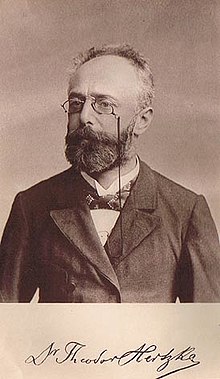| Revision as of 06:57, 14 June 2020 editBlanche of King's Lynn (talk | contribs)Extended confirmed users14,621 edits →LifeTags: Mobile edit Mobile web edit← Previous edit | Revision as of 18:27, 2 July 2020 edit undoRin (talk | contribs)Extended confirmed users, IP block exemptions, Rollbackers8,882 editsm Typo.Next edit → | ||
| Line 25: | Line 25: | ||
| Hertzka has been called the "Austrian ]", because his novel ''Freiland, ein soziales Zukunftsbild''<ref>. London: Chatto & Windus, 1891.</ref> had a similar theme to that of Edward Bellamy's novel '']''. | Hertzka has been called the "Austrian ]", because his novel ''Freiland, ein soziales Zukunftsbild''<ref>. London: Chatto & Windus, 1891.</ref> had a similar theme to that of Edward Bellamy's novel '']''. | ||
| Though Hertzka was not a Zionist and his utopian vision was directed at human beings in general, Theodore Herzl |
Though Hertzka was not a Zionist and his utopian vision was directed at human beings in general, Theodore Herzl acknowledged the influence of Hertzka on his own ideas in the opening chapter of his book ''Der Judenstadt'', envisioning the creation of a Jewish state. | ||
| ==Bibliography== | ==Bibliography== | ||
Revision as of 18:27, 2 July 2020
| Theodor Hertzka | |
|---|---|
 | |
| Born | (1845-07-13)July 13, 1845 Budapest, Hungary |
| Died | October 22, 1924(1924-10-22) (aged 79) Wiesbaden, Germany |
| Nationality | Hungarian-Austrian |
| Academic career | |
| Field | Monetary theory |
| School or tradition | Freiwirtschaft |
Theodor Hertzka, or Hertzka Tivadar (July 13, 1845, Budapest – October 22, 1924, Wiesbaden) was a Jewish-Hungarian-Austrian economist and journalist.
Life
He studied at the universities of Vienna and Budapest, and in 1872 became a member of the editorial staff of the Neue Freie Presse of Vienna. In 1879 he founded the newspaper Wiener Allgemeine Zeitung, which he edited until 1886. He was a friend of Johannes Brahms.
Hertzka has been called the "Austrian Bellamy", because his novel Freiland, ein soziales Zukunftsbild had a similar theme to that of Edward Bellamy's novel Looking Backward.
Though Hertzka was not a Zionist and his utopian vision was directed at human beings in general, Theodore Herzl acknowledged the influence of Hertzka on his own ideas in the opening chapter of his book Der Judenstadt, envisioning the creation of a Jewish state.
Bibliography
Other works by Hertzka are:
- Die Mängel des österreichischen Aktiengesetzentwurfs, Vienna, 1875;
- Das Wesen des Geldes, Leipzig, 1887
(in which he recommended the introduction of the gold standard in Austria); - Die Gesetze der Handelspolitik, ib. 1880;
- Das Personenporto: Ein Vorschlag zur Durchführung eines billigen Einheitstarifs im Personenverkehr der Eisenbahnen, Vienna, 1885;
- Die Gesetze der sozialen Entwickelung, Leipzig, 1886;
- Freiland – ein soziales Zukunftsbild Leipzig, 1890;
- Wechselkurs und Agio, Vienna, 1894
References
- Freeland: A Social Anticipation. London: Chatto & Windus, 1891.
 This article incorporates text from a publication now in the public domain: Isidore Singer (1901–1906). "Theodor Hertka". In Singer, Isidore; et al. (eds.). The Jewish Encyclopedia. New York: Funk & Wagnalls.
This article incorporates text from a publication now in the public domain: Isidore Singer (1901–1906). "Theodor Hertka". In Singer, Isidore; et al. (eds.). The Jewish Encyclopedia. New York: Funk & Wagnalls.
Further reading
- Ransom, Arthur (1891). "A Competitive Utopia," The Gentleman's Magazine, Vol. CCLXXI, pp. 44–49.
External links
- Ulrich E Bach, “Seeking Emptiness: Theodor Hertzka’s Colonial Utopia Freiland (1890)” In: Utopian Studies 22.1 (2011): 74-90.
- Works by Theodor Hertzka at Project Gutenberg
- Works by or about Theodor Hertzka at the Internet Archive